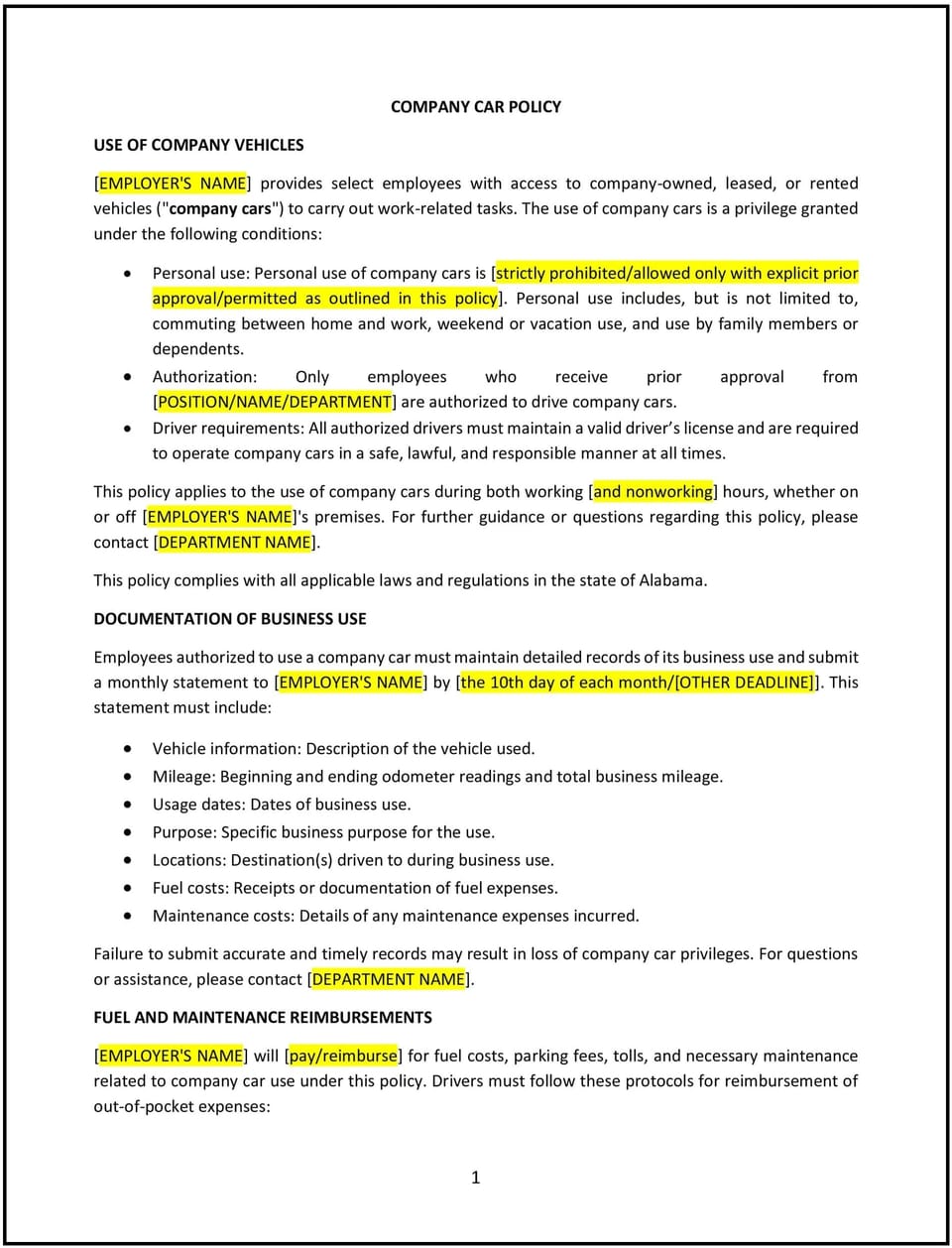Company car policy (Alabama): Free template

Company car policy (Alabama)
A company car policy establishes clear guidelines for the use, maintenance, and responsibilities associated with vehicles provided by the business. For SMBs in Alabama, this policy helps manage costs, ensure compliance with state laws, and promote safe and responsible use of company vehicles. Tailoring this policy to your business ensures alignment with your operational needs and employee expectations.
How to use this company car policy (Alabama)
- Define eligibility: Specify which employees or roles qualify for a company car, such as sales representatives or senior managers.
- Outline acceptable use: Clearly state whether the vehicle can be used for personal purposes, business travel only, or a combination of both.
- Address maintenance responsibilities: Detail who is responsible for regular servicing, fuel costs, and minor repairs.
- Ensure legal compliance: Align the policy with Alabama vehicle registration, insurance, and road safety requirements.
- Communicate the policy: Share the policy with eligible employees during onboarding or when assigning a vehicle.
Benefits of using a company car policy (Alabama)
A well-defined company car policy ensures responsible use and protects your business assets. Here's how it helps:
- Promotes accountability: Clearly defines employee responsibilities for vehicle care and usage.
- Enhances safety: Encourages compliance with road safety laws and promotes regular vehicle maintenance.
- Manages costs: Establishes guidelines for reimbursable expenses, minimizing unnecessary spending.
- Reduces liability: Ensures compliance with Alabama’s legal requirements for insurance and vehicle use.
- Improves clarity: Minimizes confusion about acceptable use, personal liability, and maintenance expectations.
Tips for implementing a company car policy (Alabama)
- Include mileage tracking: Require employees to log miles driven for business and personal use to simplify tax reporting and reimbursement.
- Address weather-related risks: For Alabama’s varying climate, include guidance on preparing vehicles for severe weather conditions, such as storms or heavy rain.
- Provide driver safety training: Offer or require training to ensure employees operate vehicles responsibly and adhere to road safety laws.
- Include insurance guidelines: Specify the coverage provided by the company and any additional insurance employees may need.
- Plan for accidents: Outline steps employees must take in the event of an accident, including reporting procedures and required documentation.
Q: Can employees use company cars for personal purposes?
A: This depends on your policy. Many businesses allow limited personal use, provided it is logged and doesn’t interfere with business needs.
Q: Who pays for fuel and maintenance?
A: Typically, the business covers fuel and maintenance costs for business use, but your policy can specify reimbursement procedures for personal use.
Q: What happens if an employee has an accident?
A: Employees must follow the policy’s accident reporting procedures, which usually include notifying the company, filing a police report, and providing necessary documentation.
Q: Are employees responsible for traffic violations?
A: Yes, employees are typically responsible for any fines or penalties incurred while using the company car.
Q: Do company cars need to be returned during extended leave?
A: Your policy should specify whether cars must be returned during periods of extended leave, such as parental leave or sabbaticals.
This article contains general legal information and does not contain legal advice. Cobrief is not a law firm or a substitute for an attorney or law firm. The law is complex and changes often. For legal advice, please ask a lawyer.


